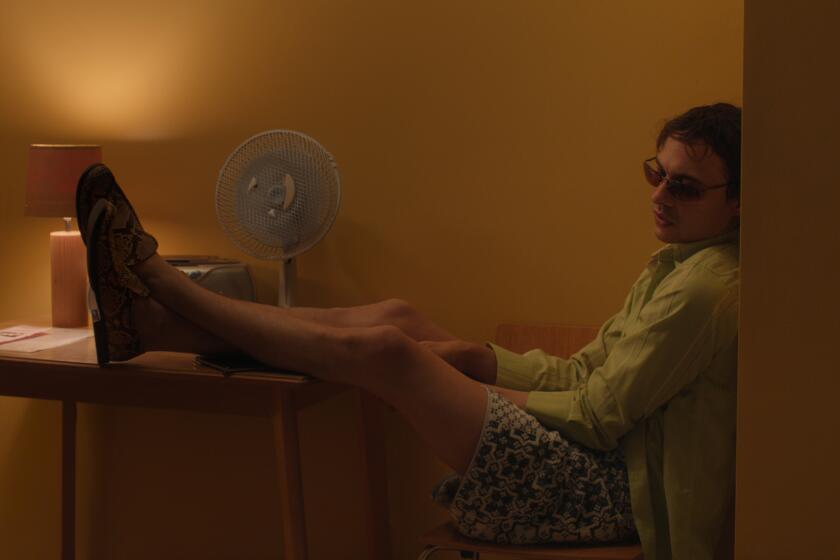Adjusting the colors
- Share via
UPN, the only network with a block of series featuring mostly African American casts, is adding a new ingredient to its urban-flavored programming: white people.
On “One on One,” a comedy about a single father raising his teenage daughter, the daughter has a white boyfriend. The father, a TV sports anchor, has a white boss. “Girlfriends,” which revolves around four single African American women, has a major story line in which materialistic real estate agent Toni is engaged to a white Jewish doctor. The title character in “Abby,” a single woman of mixed parentage, regularly dates white guys.
For the record:
12:00 a.m. April 25, 2003 For The Record
Los Angeles Times Friday April 25, 2003 Home Edition Main News Part A Page 2 National Desk 2 inches; 65 words Type of Material: Correction
African American viewers -- An article in Sunday’s Calendar about UPN incorrectly described the ethnic makeup of the audience for the network’s “Girlfriends” and “One on One,” mistakenly saying the two shows were watched in more than 85% of African American households and about 15% of white households. In fact, the two shows’ combined viewership is more than 80% African American and about 15% white.
For The Record
Los Angeles Times Sunday April 27, 2003 Home Edition Sunday Calendar Part E Page 2 Calendar Desk 1 inches; 41 words Type of Material: Correction
African American viewers -- An April 20 story about UPN incorrectly described the ethnic makeup of the audience for the network’s “Girlfriends” and “One on One.” The two shows’ combined viewership is more than 80% African American and about 15% white.
It’s a twist on the formula of most popular African American series in the last several years. “Martin,” “The Fresh Prince of Bel-Air,” “The Wayans Bros.,” “Moesha,” “Roc,” “The Jamie Foxx Show,” “The Hughleys” and “Family Matters” rarely featured white characters, or, when they did, portrayed them as clueless bumpkins who clash with the fresh and hip point of view of its key black characters.
The new trend on UPN has continued with “Platinum,” a drama set in the raw, coarse world of hip-hop music. “Platinum,” which premiered April 14, centers on two black brothers running a hip-hop label and has several white characters, including a writer for a rap magazine, a rival mogul threatening to take over the label and a rapper with more than a few similarities to Eminem.
UPN is now part of Viacom’s vast media umbrella, which also includes CBS, and management at the parent company and the upstart network alike have made crossover a priority, positioning “Platinum” as a series that could turn around a network desperate to expand its viewer base.
“This is a very important show that we think will speak directly to our audience,” said UPN Entertainment President Dawn Ostroff. “We’ve been looking for a franchise drama that will click in, and we’ve tried many different things.”
“Platinum” performed reasonably well in its initial airing last week, attracting an average 3.6 million viewers.
Leslie Moonves, president and chief executive of CBS, whose mandate includes oversight of UPN, acknowledged earlier this year that the network -- with shows ranging from the departing “Buffy the Vampire Slayer” to “WWE Wrestling” to “Star Trek: Enterprise” -- has suffered from a lack of focus: five different audiences on five different nights.
“There was the black-sitcom audience,” Moonves told television reporters in January. “Then there’s the ‘Buffy’ audience. There’s the wrestling audience, the ‘Star Trek’ audience and the action-movie audience. What we’re trying to do slowly with a show like ‘Platinum’ is to sort of bridge Monday and Tuesday nights.” Moonves said he also wanted to make “more of our casts interracial” to expand beyond an African American audience.
Eunetta Boone, creator of “One on One,” said she is comfortable with the mandate from UPN’s new management to broaden the network’s appeal with more white characters. “It’s business,” she said.
Even so, she was motivated by a desire that faced her counterparts 30 years ago, when all-white shows started introducing African American and Latino characters.
“I welcome the edict to do that,” Boone said, “but I was challenged to do it in a way where it didn’t look gratuitous. I know some shows that were completely geared to the African American audience, and when a white character was added, he or she was extra stupid and extra white. It just didn’t look real.”
In giving the 16-year-old Breanna a white boyfriend, “we wanted to make sure we didn’t sell her out,” Boone said. “So we made him cute. That was the solution. Being fine takes care of everything. And the black fans just love him. The relationship seems real.”
Mara Brock Akil, creator and executive producer of “Girlfriends,” said she had always planned to have major white characters in her comedy. “I was never given a mandate to do this. I never liked it when people would say we were on ‘black night’ on UPN. I love exploring the human experience as well as the black experience. We really wanted Toni to date outside her race, which is the experience of many professional black women.”
Robert Greenblatt, one of the executive producers of “Platinum,” along with partner David Janollari, said, “There’s no black drama on network television, so this is something totally unique to the landscape. It’s not about a black family who is struggling. This is a reasonably affluent, upscale family. It’s a character-driven family drama.”
Screenwriter-author John Ridley (“Three Kings”), who created “Platinum” along with director Sofia Coppola, said he is confident that his show can avoid the pitfalls. “There is a real hip-hop mentality to this series, and this is the music that everyone -- black, white -- loves,” he said.
The show’s hip-hop backdrop should attract viewers across the board, UPN’s Ostroff said, alluding to the recent box-office success of “8 Mile,” starring Eminem, and adding that 70% of the 18- to 34-year-olds who purchased rap music CDs last year were white.
Currently, UPN’s most reliable night of programming is its Monday slate of comedies, including “The Parkers,” “One on One” and “Girlfriends.” The lineup has grown in popularity during the last four years, particularly among African American viewers attracted by the shows’ brashness, predominantly minority casts and hip-hop references.
But that success has not yet translated into increased viewership with a broader audience. In fact, those shows are among the lowest rated nationally among white viewers. Both “One on One” and “Girlfriends,” for example, are among the top-rated series among blacks, watched in more than 85% of African American households. But among whites, the two shows barely register, seen in about 15% of white households.
Urban-themed shows have traditionally had difficulty crossing over to a wider audience. But UPN, Fox and the WB have used the shows as building blocks to establish themselves on the TV landscape.
For years, Fox and the WB, seeking favor with niche audiences, used several predominantly African American shows to gain a foothold with an audience they felt was underserved and longing for shows targeted for them. “In Living Color,” “Martin,” “Living Single,” “The Jamie Foxx Show” and others found their biggest audiences among black viewers, but little favor among white audiences.
The two networks also tried expanding their viewership, developing shows with fewer minorities. As Fox and the WB had increased success with a wider viewership, the predominantly black programming blocks were gradually phased out. UPN remains the last network with a so-called “urban night.”
The quest to integrate
The effort to get more white faces on UPN shows is clearly the newest twist in television’s desire to more accurately mirror the TV audience at large. But the decades-long ambition to integrate shows with predominantly white casts continues.
Taye Diggs, for instance, is joining the cast of NBC’s “The West Wing” for a few episodes. The most notable example, though, is “Friends,” which has often been criticized for not showing diversity despite being set in the undeniably multicultural New York City. Starting Thursday, Aisha Tyler will appear for several episodes as a doctor caught in a love triangle between Ross (David Schwimmer) and Joey (Matt LeBlanc).
Producers of the comedy say they were not specially writing the doctor’s role for a specific ethnicity. “They just fell in love with Aisha,” said a show spokesman.
On UPN, racial diversity is already a part of “Enterprise,” which, like previous “Star Trek”-inspired series, features a veritable rainbow coalition of multiethnic humans ... and aliens. And on “The Parkers,” Kim’s best friend is white (Jenny von Oy).
In recent months, the additional white characters on the existing UPN shows with black casts have not noticeably heightened the shows’ popularity among white viewers, noted Doug Alligood, senior vice president of special markets for the advertising firm BBDO Worldwide. Although “Platinum” may initially score with black viewers, white viewers may be slower to tune in.
“It’s just not a strategy that is working with them,” he said.
Alligood pointed to minority-themed dramas in the last several years, such as “City of Angels,” “Under One Roof” and “New York Undercover,” which did not have crossover appeal. “The shows might have been seen as too preachy or too exclusive for a white audience,” he said. “But you also have to take into account that some of those shows just weren’t that good.”
More to Read
The biggest entertainment stories
Get our big stories about Hollywood, film, television, music, arts, culture and more right in your inbox as soon as they publish.
You may occasionally receive promotional content from the Los Angeles Times.











